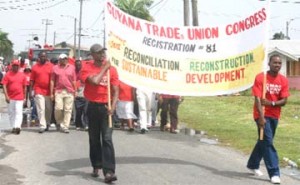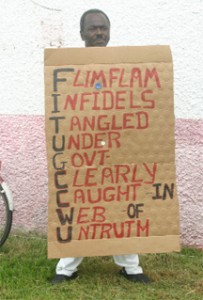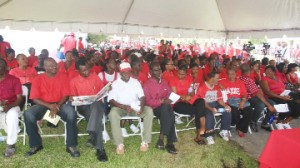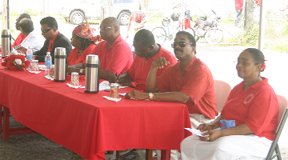– Aubrey Armstrong tells GTUC rally
The Guyana Trades Union Congress (GTUC) yesterday sounded the need for “change” in the labour movement and one of the featured speakers called for unity in the face of the “perfect storm”.

With the impact of the global financial crisis, including the regional meltdown suffered by CLICO affiliates in the region looming large, hundreds of workers who gathered at the umbrella body’s annual Labour Day Rally at the Critchlow Labour College (CLC) were told that they faced common hardships and would be called upon to show their strength by taking back the movement and the country from political oppression. “I’m telling you this, if we don’t get a change, there is going to be ‘PPP’ in this country: ‘piss and pepper to pay,’” management consultant Dr Aubrey Armstrong said to a roar of cheers from the gathering. “When they can no longer deliver-here what is going to happen-this ruling clique is going to fall down into the gutters of history, you take my word for it.”
In an address to the rally, Armstrong, a PNCR executive, admitted that the labour movement has its “faults,” and said the unions have to “get their house in order.” Along this line, he stressed the need for the movement to start using its assets more progressively, rather than relying on the government, citing the experiences of the GPSU. Although he supported the call for the return of the subvention to the CLC, he said labour has to prepare itself by accessing funding sources outside of the government. Additionally, he identified the need for labour to rebuild momentum, taking back places where it has traditionally gotten support, in order to regain unity among the working class and speak with a strong and firm voice in order to claim their vision. “We have to unite in the face of the ‘perfect storm,’” he said, “unite within the union movement; unite within the political movement, [and] we have to talk to each other.” He called on leaders within the movement to sit down and discuss their problems in a systematic way, while also including the next generation which has to be prepared to take up the mantle of leadership.
Armstrong emphasised the idea of the legacy of the labour movement, saying that in order to sustain it, there is an important need to prepare the next generation of leaders who would stand on the shoulders of those who came before them.

However, he said there has been a “perfect storm”-created by the combination of the financial crisis with other factors-that has put the dreams for the future in jeopardy. Speaking about the financial crisis, he noted that its effects are being felt both regionally and locally, such as in the meltdown of the CL Financial group. “You see the CLICO issue? It not going to go away and a number of people need to go straight to prison and, if the police weren’t here, I would have said straight to … prison,” he said, adding that the same greed that drove the international financial meltdown drove the CLICO financial meltdown.
According to Armstrong, with the global recession, jobs are being lost in the region and he warned that Guyanese in the islands would feel the pressure. Similarly, with the swine flu pandemic, he projected that tourism would suffer as happened with the SARS outbreak and tourist destinations in the region like Barbados, Trinidad and Jamaica would be targeting immigrants, including Guyanese. Additionally, he noted that in a time of recession, remittances would start to fall back.
In this context, he argued that unions need to push for a new economic model that limits speculation and risk and allows transparency when deals are being done. The new model needs to be linked to jobs and jobs security, he explained, while workers should not have to worry about the safety of their pensions like CLICO investors and policy holders. He added that there is need for a fair and balanced economic model with growth and trade that protects the environment and future.
GTUC President Gillian Burton agreed that union leaders need to admit their faults where detected, but also to strive to resolve their issues internally. “We must make stringent efforts to work in harmony and to rekindle the flame of friendship and camaraderie in the trade union fraternity,” she said, adding that leaders of the union movement need to move away from pettiness and envision and commit to a clear path to sustain it.

Burton also told the rally that the government’s legislative agenda has been inimical to the interests of workers and she issued a public call to President Bharrat Jagdeo to meet with labour leaders to address their concerns. “Our needs are far too many and you need to make yourself present at the conference table and work out with us the way out of our dilemma,” she pointed out, while reminding that he remains a public servant as well.
Although this year’s March and Rally were held under the theme, “Reconciliation, Reconstruc-tion for Sustainable Development,” the call for “change” was the common thread holding it together.
“Change is coming,” acting GTUC General Secretary Norris Witter shouted to the crowd.
“How long?” the crowd asked.
“Not long!” he declared.
However, the spectre of the division in the labour movement reared its head at the start of the rally, when members of the rival Federation of Independent Trade Unions of Guyana (FITUG) marched past the CLC to attend their own rally at the National Park. Union leaders expressed disappointment at the situation, but were also hopeful that the workers under the FITUG umbrella would join the GTUC in order to address the challenges they all faced. The CCWU, a member of both FITUG and the GTUC boycotted both rallies this year because of the ongoing rift in the labour movement.

The rally yesterday passed motions calling on the GTUC and all trades unions registered in Guyana to vigorously pursue an end to the imposition of salary increases; the reintroduction of the CLC grant; the reintroduction of the GTUC grant; the high cost of living; unemployment; human rights abuses; government corruption; the suppression of free speech; the suppression of information about CLICO; the management of state entities; and the substantive appointment of acting Chief Education Officer Genevieve White-Nedd.
“We have the capacity to overcome these challenges and together we will overcome [them] because unity is strength,” Witter said. “Because I believe they are not happy with the leadership they are receiving from those who are misleading them,” he added.
Meanwhile, GTUC General Secretary Lincoln Lewis noted that the labour movement has been calling for some time for home grown solutions to raise the standard of living for the working people. “It is time we prepare not only to march but to change the course in this country,” Lewis declared, saying that workers must be prepared to take to the streets of the capitals across the region to give a timely reminder that labour is alive and well and is prepared to play its part in facing the challenges.
Although there has not been a full analysis of the impact of the global financial crisis, he said that the labour force has been faced with job cuts, pay cuts and the accompanying uncertainty about the future. As a result, he emphasised the need now more than ever for elected leaders to craft solutions to the challenges being presented. At the same time, Lewis railed against the political leaders in government who are waiting for the results of initiatives by US President Barack Obama and UK Prime Minister Gordon Brown. He said now is a historic time for people in the region, since no single stakeholder can fashion an independent solution to the crisis, resting on the pursuance of self reliance, self sufficiency and national pride. He called for a new frontier and new democratic order involving the participation of the people as partners in decision making. “We have no choice but to work together, it is our people who ought to be dictating what the government ought to be doing,” Lewis said, adding “when decisions were made to invest their money in certain places, the workers were simply bystanders and it is time to take our rights and say enough is enough.”
At present, he said, the sense of partnership is not as strong as it ought to be, a situation he lamented since the challenge is a common one. In this regard, he called on those at the rally to become catalysts for change. Further, that the demand for pragmatism be met by all sides. “The period ahead requires sacrifices from all of us and may also require us to make decisions that affect our selves, our country and our region,” he explained, adding that he did not mean the model offered by the government with the passage of the Former President’s benefits bill. “While you want to eat mutton, the workers getting nothing,’” he complained.









